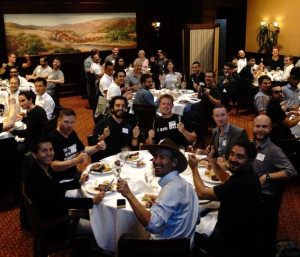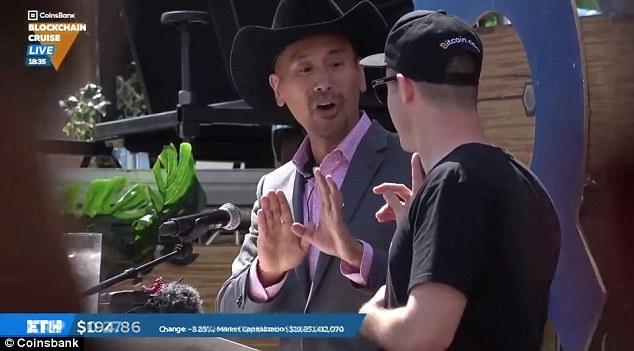The midweek work crowd rushes in and out noisily at Caffé Medici, a hip single-origin downtown Austin coffee house shouting distance from the state capitol building. Everything here—from the boisterous business-casual crowd to the slightly-too-loud acoustic music to the worn-leather couch and frayed rug—feels like it’s straining for calm but failing. In this din, Jimmy Song stands out, not just because he’s wearing a cowboy hat and boots (not common, even in Texas) and is Korean-American, but for his unmanufactured stillness. The bitcoin maximalist, sipping a small latte from a paper cup, acts as if he’s in no hurry to go anywhere.
The Buddha stereotype may come to mind but it isn’t quite right; Song is lean and wears a black t-shirt promoting meat-heavy dinners. He looks much younger than his 40ish years. His serenity, springing from true belief at a time when many in the crypto industry have been, to put it mildly, freaking the freak out, is striking. He’s chill even when he potentially burns bridges while laying down apocalyptic smacktalk. Song is unsparing as he looks ahead at the future of bitcoin, in which he is heavily, zealously invested.
He has relished, as a former full-time coder and now online gadfly, watching parts of the crypto world burn.
“Where is this industry going to be for the next 10 years that I can really leverage and provide goods and services to people where I can get paid?” he asks. “That’s the right way to think, not this crazy, ‘I’m gonna be rich six months from now.’ That’s so stupid. It’s a very short-term way to think. And those people almost always get burned.”
He has relished, as a former full-time coder and now online gadfly, watching parts of the crypto world burn. He finds heresy in those who don’t share his view that pure, original-flavor bitcoin should rule the future, not hard-forking altcoins such as Ethereum and other blockchain technologies he proselytizes are lesser tech.
“Developers are abandoning projects, weak coins are getting double-spent… and ICOs are running out of money,” Song says. “This is a good thing.”
Song has devoted much of his last eight years to bitcoin devotion after seeing the light and converting in 2011. He’s experienced some financial scares over the cryptocurrency’s volatile history, but they’ve only made his faith stronger. 2018’s whirlwind of bad news didn’t shake him. “I’ve been through this before. It’s scary the first time, but you emerge more antifragile.”

Though Song says his attention-grabbing cowboy get-up is a nod to the “Wild West era” of the crypto industry, he hardly obeys John Wayne’s cowboy code: “Talk low, talk slow, and don’t say much.” Song has risen from practical anonymity two years ago to a well-known and controversial writer, tech teacher, and evangelist. He can typically be found testifying on Medium, on YouTube, on Twitter, on podcasts, on tech conference panels, anywhere there’s an audience to hear the message.
Unbeholden to startup investors or any corporate boss, he’s earned a reputation as one of the industry’s most notorious preacher-gunslingers, raining holy gunfire at rival blockchain frontiersmen, including Bitcoin Cash’s Roger Ver and ConsenSys CEO Joseph Lubin.
“I’m sure they’ll have even more layoffs as Crypto Winter settles in,” he says bluntly of Lubin’s company. “Malinvestment like many of the ConsenSys projects need to die during bear market cycles, so I’m not surprised.”
“Malinvestment like many of the ConsenSys projects need to die during bear market cycles."
He’s called the cryptocurrency EOS “a scam,” said Bitcoin Cash “has no reason to exist,” and written, “Most of ‘Blockchain tech’ is really a bunch of smoke and mirrors… There’s nothing there.”
Along the way, Song’s uncompromising fervor has attracted converts who cheer him on via social media. But it’s also making him plenty of enemies eager to demonize him or at least pray he’ll just go away. You wouldn’t know it from Song’s serene smile, as if he’s got the power of bitcoin itself inside, and it compels him.
As he speaks with a contented convert’s assurance about how his life led him to bitcoin he keeps coming back to the concept of “self-sovereignty.” He means having the financial freedom he’s found to do whatever he wants for as long as he wants. That might mean spending months writing a book about programming, or sitting for a few hours with a journalist in a noisy coffee shop to share the good word. Self-sovereignty, says Song, is good. Everyone should be so lucky to have bitcoin in their life and to benefit from its blessings. Being a wage slave with no control over your life and beholden to a centralized government’s idea of freedom? That’s the devil’s path.
I realize he’s describing the gospel according to Jimmy Song.
A few years ago, Jimmy Song was just another got-in-early investor in bitcoin who was bouncing from coding job to coding job in Austin’s startup scene.
By early 2018, to those in the bitcoin world, it seemed like Song suddenly began to appear everywhere with blog posts, a booming Twitter account that swelled past 100,000 followers, and speaking appearances that had him rubbing shoulders with the blockchain elite.
Those who only know him from his talking-head YouTube videos or his provocative, blog-baiting comments, probably aren’t aware that his background is in math and programming, not communications or finance. He has a math degree from the University of Michigan and spent years working in Boston, then Texas after leaving South Korea at 8 and growing up in New Jersey.
In 2011, he came across a Slashdot article on bitcoin. He’d been working as a coder for companies in Austin such as Gramify, RetailMeNot, and Athenahealth. Something clicked. He knew he was seeing something more than just novel new technology.
He didn’t jump in when he should have, he says now. He wasn’t quite ready to believe.
“I looked into it and I was kind of blown away by the concept, but I didn’t necessarily look into the tech aspect,” he says.
“It was more, ‘OK, it’s decentralized money, there’s only ever gonna be 21 million of it,’ right away, I got it. OK, if it’s fixed, you start thinking about scarcity. And then, ‘How the Hell am I gonna get my hands on some of this stuff?'” Bitcoin, at the time, was valued at about a dollar.
Get the BREAKERMAG newsletter, a weekly roundup of blockchain business and culture.
Making a digital wallet and dealing with the Mt. Gox exchange at the time, “was just too much of a headache,” he says, “probably one of the biggest regrets of my life.”
He did get into the market later that year when bitcoin had surged closer to $10. On his birthday, April 10, 2013, bitcoin crashed hard, prompting Song to get his money off Mt. Gox. But something still pulled at him about it. He decided to learn how it all worked, and that led him from one coding rabbit hole to another, absorbing each lesson’s teachings.
“I’d been a coder for 15 years, so by that point it wasn’t terribly hard, but the documentation was almost non-existent and learning was kind of frustrating,” he says. “But eventually I learned it, I secured my own coins, got my coins off Mt. Gox, and thank goodness I did, oh my goodness.”
When he wasn’t working, he sought out bitcoin-related freelance gigs on places such as Reddit and eventually worked on a Colored Coin project out of the Ukraine. He was paid in bitcoin to learn bitcoin just as it was surging. And his belief was growing.
“I thought, ‘This is freakin’ awesome!’ He was paying me $100 an hour, but really by the end of it, it was like $1,000 an hour.”
The skills he was picking up led to jobs at financial tech company Monetas and a wallet company called Armory Technologies (both are now defunct), then the blockchain risk-management startup Paxos.
Debating Roger Ver on the 2018 CoinsBank Blockchain Cruise (courtesy of CoinsBank)

In early 2017, while there, he did some blogging for the company, including one post he says was rejected for being too focused on bitcoin. “I spent a lot of time on it, so I shopped it around and nobody wanted it. So I published it on my own on Medium and it kinda went viral, at least what I thought was viral at the time,” he says.
The post, “Why Bitcoin Will Get Scaling Without Segwit or Large Blocks,” got enough attention that he wrote another post the next week. And then another one the week after that. From the genesis, his opinions were strong. His faith in bitcoin’s potential to change the world and allow for more self-sovereignty was becoming increasingly unshakable. Song blogged on Medium, attracting an audience of readers and Twitter followers, from a few hundred to tens of thousands in his first few months. He got invited to be on YouTube shows. He started his own YouTube channel, “Off Chain With Jimmy Song.”
A lot of his videos are short extemporaneous testimonies on very specific issues and problems in the bitcoin world spun from whatever’s happening that week. But others include animation to make complex technical concepts more accessible. He sometimes goes a long way to make a point, such as why he thinks decentralized apps are nothing new and widely overhyped. He doesn’t shout, he doesn’t rant; he preaches like a youthful pastor trying to help his faithful flock out.
The posts and videos and podcast appearances led to invites for speaking engagements at conferences all over the world. Seeing a chance to connect with other knowledge seekers, he also started a series of “Carnivory” dinners, meat-focused suppers that are sometimes streamed online.

When he quit his job at Paxos in late 2017 after about half a year building a name for himself online, he started teaching a $3,000-$4,000 programming bootcamp, instructing coders how to build a wallet and blockchain from the ground up. He wrote a book on the course for O’Reilly Media (out in March) and has plans to make an online course.
“It took me a couple of months of working up the nerve to go on my own. I knew I know how to teach, how to talk about stuff, how to write. These are skills that employers don’t necessarily value. When you’re an entrepreneur, you have this ability to arbitrage more of your skills. That’s what I found.”
Song says the course he teaches offers a semester’s worth of learning in two days. “It’s extremely intense,” Song says. “I’ve never had anyone tell me it’s too easy.” Disciples of Song have gone on to populate companies including Xapo, ShapeShift, and Purse.
It’s not a coincidence that those are companies primarily focused on currency and building upon Bitcoin Core, the original article. To Song, bitcoin isn’t a test case for the potential of blockchain; it’s the reason that blockchain exists.
“Bitcoin allows for self-sovereignty,” Song says, “It encourages entrepreneurship, less rent-seeking behavior, for people to find gaps in the market where they can utilize their skills and talents to value to civilization.”
Who are rent-seekers? They’re people such as lawyers, tax collectors, and marketers who help devalue money without adding to society, according to Song. (Song doesn’t suggest the comparison, but there are some who call Jesus the world’s first nonviolent tax protester.)
Song says the course he teaches offers a semester’s worth of learning in two days.
What he sees when he looks at altcoins that branch off from bitcoin is more rent-seeking. “I don’t know how long it’ll take, but I think Ethereum doesn’t really add much value, if at all. The market can remain ignorant of that for a long time, but I expect time to prove me right eventually,” he says.
He recently tweeted, “Fiat money teaches people to kiss up to the rent-seekers in power, which usually means outsourcing thinking to a centralized authority. This retards creativity and entrepreneurship.”
And if that doesn’t raise the stakes sufficiently, there’s this: “Bitcoin is the one chance we have to decentralize power away from the rent seeking ruling class. Don’t be distracted by promises, political kayfabe, altcoins or social sedatives. Bitcoin is our one chance at real change.”
Your soul, in other words, can be saved.
To Song, successfully putting himself out into the world as a teacher and evangelist has rewarded his faith in bitcoin.
And that’s further calcified his beliefs.
To Jimmy Song, the path ever since has been clear.
In person, Song is unfailingly polite; he is prone to explaining calmly and rationally, as he does in his videos. He smiles a lot. He doesn’t raise his voice
But on Twitter and in podcasts, where he fires off whatever’s on his mind, he’s more combative, more Old Testament fire and brimstone. On New Year’s Eve, he tweeted, “Bitcoin is the money of enemies, the soundness of the money doesn’t benefit from group hugs. Therefore, calls for unity, civility, a kinder community, etc, are all grossly misguided when it comes to Bitcoin. Such concepts are used to control others’ behavior. #intolerentminority”
And there’s been a backlash. “Does Jimmy Song Know What Fiat Money Is?” asked one investor in a CryptoBriefing column. A YouTube commentary watching a Chicago Carnivory dinner asked, “Does Jimmy listen to anyone apart from himself?” “Jimmy song is very smart but sometimes he becomes an asshole,” said one reader, responding to some of Song’s comments.
Where Song’s passion in freeing the world from centralized money meets those who don’t agree with his worldview, things can go badly. If you’ve ever seen a Methodist and a Baptist argue, you’ll understand how difference between branches of the same religion can result in the most intense disagreements. Same God, different church.
For Song, it happened on a Mediterranean cruise last summer.

That cruise. The June 2018 voyage that was all over YouTube and bitcoin blogs, and that was even written up in the U.K.’s The Daily Mail, with the headline: “Bitcoin brawl.” Song’s debate with Bitcoin Cash booster Roger Ver was a repeat of a similar event a year earlier, but more stagey—on a cruise ship in the blazing mid-afternoon, and not at all resembling a brawl (those voices were definitely raised). The conversation was doomed from the start. Instead of a theater, it was out in the sun—less Nixon/Kennedy than MTV Spring Break. The two treated the microphone like the conch shell in “Lord of the Flies,” taking command of the conversation as if the future of the world depended on it. Song hammered his point that Cash is a fiat currency. Ver suggested a million-dollar bet over whether bitcoin or Bitcoin Cash would be worth more in 10 years. Song is sorry the debate turned on questions of personality (as he saw it) not big ideas. He envisioned Lincoln vs. Douglas, and didn’t imagine bikinis, ankle-high pool water, and a guy calling his views on decentralized currency “a bunch of nonsense.”
Song won’t let go of the bet offer made on that stage (as with one he made with Lubin). “I emailed [Ver] multiple times” offering to make a wager, Song says. “He says ‘I don’t want to bet you.’ That was all showmanship as far as I’m concerned.”
“He called me arrogant.”He’s really not happy with me,” Song says of Ver, who did not respond to requests for comment.
Last year’s volatility in bitcoin didn’t test Song’s faith because he’s thinking in a different category time to the rest of us. “Bitcoin has led me to think more long-term. What am I gonna be like when I’m 80? That matters to me. I think that way in almost all of my life. That’s the way you have civilization building.”
Song is betting on bitcoin and his own children—he has six, from a toddler to pre-teenagers—to see him through old age.
“I don’t think I’m gonna get my Social Security. I don’t think Medicaid is sustainable. The traditional social security system was children. Instead of big-daddy government, I have kids,” he says, only half-jokingly. He went forth and multiplied, as per instruction, and for a long time, that plan seemed good. Then a second path opened up. Now he has bitcoin.
Jimmy Song asked us to let you know he is appearing on several panels at SXSW’s Blockchain event this March. The Kindle version of his bitcoin programming book is now available.